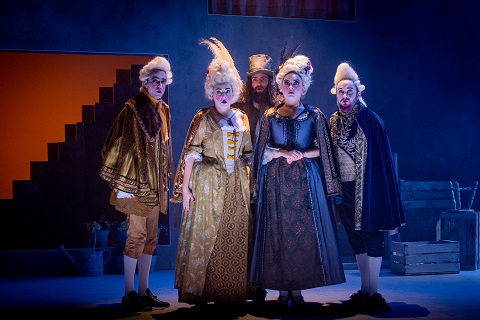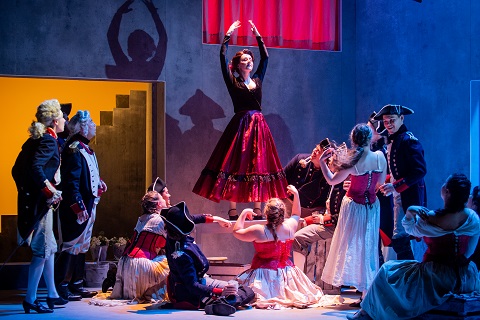14 Mar 2020
Massenet’s Chérubin charms at Royal Academy Opera
“Non so più cosa son, cosa faccio … Now I’m fire, now I’m ice, any woman makes me change colour, any woman makes me quiver.”

“Non so più cosa son, cosa faccio … Now I’m fire, now I’m ice, any woman makes me change colour, any woman makes me quiver.”
Beaumarchais-Mozart’s hyper-sexed adolescent, Cherubino, speaks of love when dreaming, when awake, and even when there’s no one there to hear his radiant romanticising, inspired by burning desires he can neither understand nor control.
In the third of his ‘Figaro plays’, La mère coupable, Beaumarchais’s excitable young page enjoys a night of passion with the Countess Almaviva only for her to suffer pangs of guilt and dismiss her lover, sending him into spiral of depression, derring-do and death. With suicidal recklessness he runs off to battle and is mortally wounded. The Countess reads his dying words of regret and love; shortly after she finds she is pregnant with Cherubino’s child.
French playwright Francis de Croisset had other ideas. Chérubin, the eponymous protagonist of de Croisset’s 1901 ‘Figaro-sequel’ hasn’t changed much since his days spent panting in the Countess’s dressing-room or gallivanting with Barbarina in the nocturnal garden. Now a swaggering, swooning seventeen-year-old in Seville, he is looking forward to celebrating his birthday and his new military commission by inviting countesses, baronesses, the Duke’s mistress and the girl-next-door to his fête galante.
Jules Massenet was charmed by de Croisset’s Chérubin when he saw it at the Théâtre-Français and just two days later he had obtained the rights to the play in order to set it as an opera, which he termed a comedie chante, with the aid of de Croisset and Henri Cain. The resulting rococo confection, which bubbles with playful pastiche and parody, went down well with its first audiences in Monte Carlo in 1905 (the premiere took place, serendipitously, on 14th February), and subsequently was well-received in Paris. Fauré praised its Mozartian spirit and grace.
 Photo credit: Robert Workman.
Photo credit: Robert Workman.
Requiring a large cast, and with copious juicy roles for several female voices, it’s a good choice for a student ensemble, and Royal Academy Opera have frothed up a flighty and frivolous evening of fun. Duels are threatened and diverted. Swords are unsheathed, sensuous serenades sung, and Spanish dances sashayed. Chérubin woos women from dawn to dusk, despite the warnings and guidance issued by his compassionate and wise mentor, The Philosopher.
Director James Hurley and designer April Dalton take a tongue-in-cheek glance towards the eighteenth-century. Period costumes are sumptuous, the rouge is slapstick and the bygone rococo world is filtered through bright modern lights. There’s a touch of Peter Greenaway in the juxtaposition of cool gentility and vibrant excess, as the angled grey walls of Dalton’s set reveal curtained niches of eye-popping hues. At the start, we might be at Orlovsky’s party, if only the large cast’s opportunities for hedonism were not curtailed by the constriction of the design’s small spaces. The back walls, which push the action quite far forward on the Susie Sainsbury Theatre stage, also bounce the sound out into the auditorium with energetic thrust: it’s a busy and boisterous production, and occasionally - for example, in the moonlight episodes of the second act - a little more contrast of light and shadow, laughter and serenity, might have been welcome.
However, these are minor misgivings. This second-night, second-cast performance was a delight of musical nostalgia, affectionate whimsey and charm. Massenet clearly enjoyed himself composing this opera and so the singers and musicians relished performing his exuberant score. Though, conductor Anthony Legge (currently Interim Head of Opera) didn’t obviously evince the lilt and grace of French comedy, he ran a tight ship and his instrumentalists played with terrific precision and verve. There were some lovely woodwind colours and plenty of Spanish flavour. Legge didn’t seem to give the singers much attention or guidance, but, then, they didn’t seem to need it.
 Grace-Marie Wyatt (L’Ensoleillad). Photo credit: Robert Workman.
Grace-Marie Wyatt (L’Ensoleillad). Photo credit: Robert Workman.
The three principal soprano roles were well differentiated and engagingly characterised. In the title role, Lithuanian mezzo-soprano Gabrielė Kupšytė glowed with dizzying charm and puppyish enthusiasm, by turns frisky, petulant and introspective. Kupšytė displayed gamine grace as the would-be Casanova, chest puffed out in faux-mature posturing. A thwarted opportunity for sword display resulted in a fit of pique and melancholy: Mozart’s young page seemed hardly to have ‘grown up’ at all. Infectiously ‘love-drunk’, Kupšytė’s first aria, ‘Je suis gris! Je suis ivre!’, dazzled with a lovely sheen and thrilling bloom, but there was moving and tender sincerity when the confused young lover asks The Philosopher to explain why the merest thought of a woman so inflames his heart with uncontrollable passion. Bass Ossian Huskinson was a strong, dignified presence as The Philosopher, displaying a warm, generous tone, and sonorously sharing his wisdom with his charge.
As the Spanish dancer, Ensoleillad, Grace-Marie Wyatt used the plush layers and fruity lower range of her soprano to show us why she had ensnared the Duke’s heart. Sensuous and impetuous, this Ensoleillad enjoyed the favours and admiration bestowed upon her but kept a cool head when required. Her aubade, ‘Vive amour qui rêve, embrasse, et fuit’, was beautiful, and Chérubin - still reeling from the heady scents of the sweet love-duet that they sang at the end of Act 2 - would have done well to heed her words: “Long live love that dreams, blazes and flees,/ Long live love that dies in one night.”
Samantha Quillish impressed in all three of RAO’s 2019 productions, most especially in the title role of Tchaikovsky’s Iolanta , and here she was outstanding as Nina, the ‘nice girl’ whom Chérubin overlooks as he chases his aristocratic darlings. Her act 1 aria was a lovely moment of simplicity and stillness amid the revelry and carousing, and in the final act - a sombre figure in black, as Nina prepares to enter a convent - she sustained a sense of sincerity when things took a sentimental turn.
In the comprimario roles of The Count and The Baron, James Geidt and Dan D’Souza were convincingly patrician and urbane, while Camilla Harris (The Countess) and Elspeth Marrow (The Baroness) were mischievously entertaining as two bored aristocrats in search of some fun. Maxwell Levy (Capitain Ricardo), Andrew Johnston (The Innkeeper), Peter Harris (The Duke) and Connor Baiano (Officer) made up the fine cast, and there was lively support from the 24-strong chorus who nimbly negotiated the steps, stairs and niches of the set.
When a rare moment of common sense throws Chérubin into Nina’s arms and the young lovers creep away, Massenet and his librettist have one last laugh. As Ricardo and The Philosopher wryly identify them as ‘Don Juan’ and ‘Donna Elvira’, the orchestra strikes up ‘Deh vieni alla finestra’. Will Nina become just one of the ‘mille e tre’ seduced Spaniards in Chérubin’s catalogue of conquests? It’s hard to believe: Massenet’s music is too sweetly sentimental, surely?
The esteemed nineteenth-century critic and scholar, Adolphe Jullien, an early admirer of Massenet, summed up the composer’s allure: ‘On leaving the theatre when this froth of sound has subsided, one feels a trifle embarrassed at having allowed one’s self to be carried away; and if one wishes to probe to the core this dazzling, shimmering music, it is easy to see that there is in it little substance and novelty. But when the curtain goes up again we promptly come under its spell once more, and again we feel the lively attractiveness of this fresh and sparkling music. A great magician in truth, is the composer of Chérubin.’
This production certainly sparkled with the spirit of make believe and held us under its spell.
Claire Seymour
Massenet: Chérubin
Chérubin - Gabrielė Kupšytė, L’Ensoleillad - Grace-Marie Wyatt, Nina - Samantha Quillish, La Comtesse - Camilla Harris, La Baronne - Elspeth Marrow, Le Philosophe - Ossian Huskinson, Le Comte - James Geidt, Le Baron - Dan D’Souza, Le Capitaine Ricardo - Maxwell Levy, L’Aubergiste - Andrew Johnston, Le Duc - Petter Harris, Un Officier - Connor Baiano; Director - James Hurley, Conductor - Anthony Legge, Designer - April Dalton, Lighting Designer - Ben Pickersgill, Movement Director - Victoria Newlyn, Royal Academy Chorus and Sinfonia.
Susie Sainsbury Theatre, Royal Academy of Music, London; Thursday 12th March 2020.